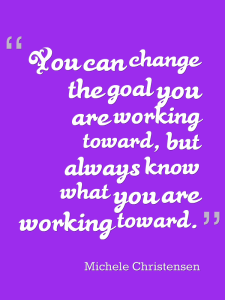 Someone asked me a question recently, and I thought it was such a great one that I decided to answer it here. I was at a training, and when I mentioned that I coached entrepreneurs, the person I was talking to asked me “How do you keep them on track? Entrepreneurs, myself included, are always changing gears.”
Someone asked me a question recently, and I thought it was such a great one that I decided to answer it here. I was at a training, and when I mentioned that I coached entrepreneurs, the person I was talking to asked me “How do you keep them on track? Entrepreneurs, myself included, are always changing gears.”
It’s a great question because he’s right – entrepreneurs are naturally drawn to new ideas and possibilities – bright, shiny objects anyone? Enthusiasm for new ideas is one of an entrepreneur’s greatest gifts and also one of the greatest challenges. Nobody goes into business with the desire to be bored.
Let me share a little of my philosophy first – I don’t “keep” people on track, because that implies force or power and I don’t believe entrepreneurs want or need that. Entrepreneurs are naturally motivated and love results, so guidance and perspective are better tools than force for entrepreneurs.
What I do is help business owners get clear on what they want to accomplish and how to get there. As they move forward, we tackle roadblocks together. When the inevitable “next big thing” pops up, I remind them of where they said they wanted to go and we assess if this new thing fits into that goal. If it does, we figure out how to fit it into the current plan. If it doesn’t, we talk about whether or not the original goal still fits. The beauty of running your own business is that you get to decide what the goals are and when to change them.
A word of caution – if you change your goals too often, you may end up never reaching them. I think this is one of the biggest hurdles entrepreneurs face – being able to stay with something after it gets boring but before it produces results. Most new projects go through the “darkest before the dawn” phase where the newness has worn off and finishing the project becomes a slog through tedium to get to the finish line. This is the worst time to give up – when completion is just around the corner.
This is a great example of how strategy and planning in a business pay off. If you start with a goal and a plan to get there, you have a criteria against which to weigh any potential new ideas. If the new idea fits, then use it. If it doesn’t, you have the option of changing your goal or your plan but do it intentionally and not because you got bored.
